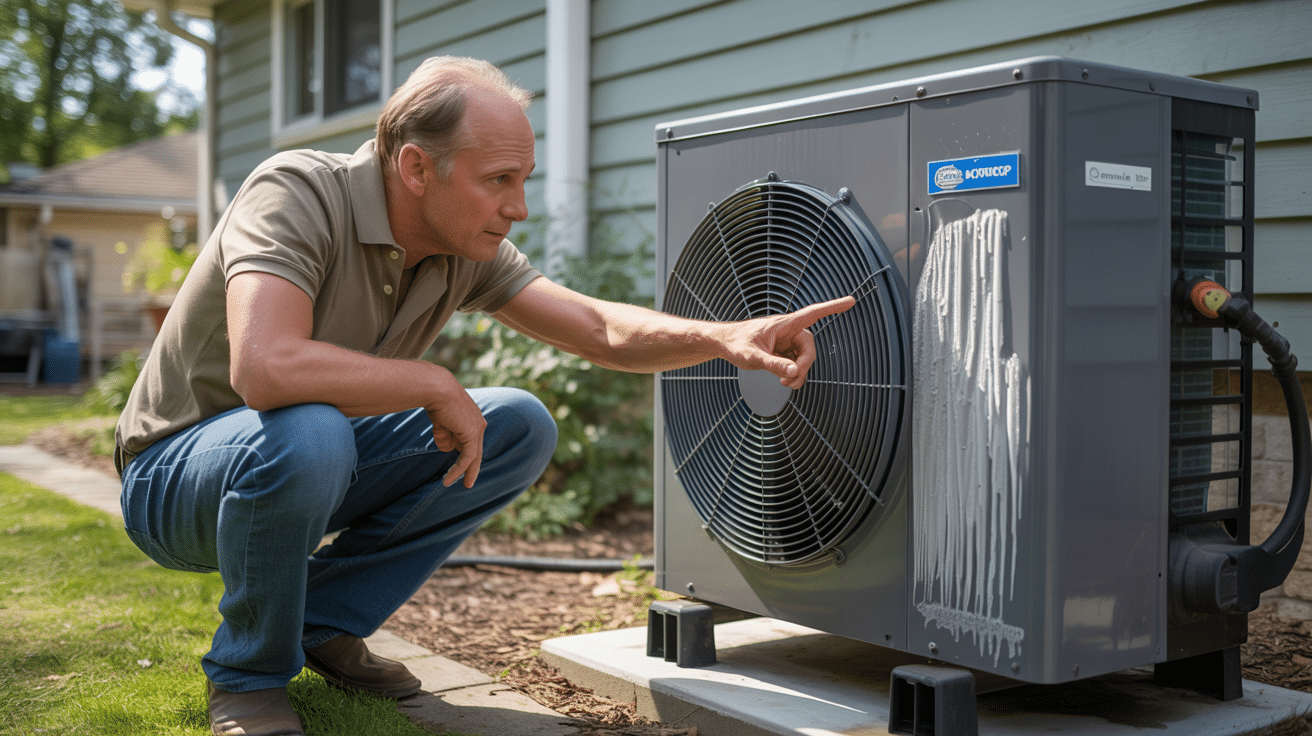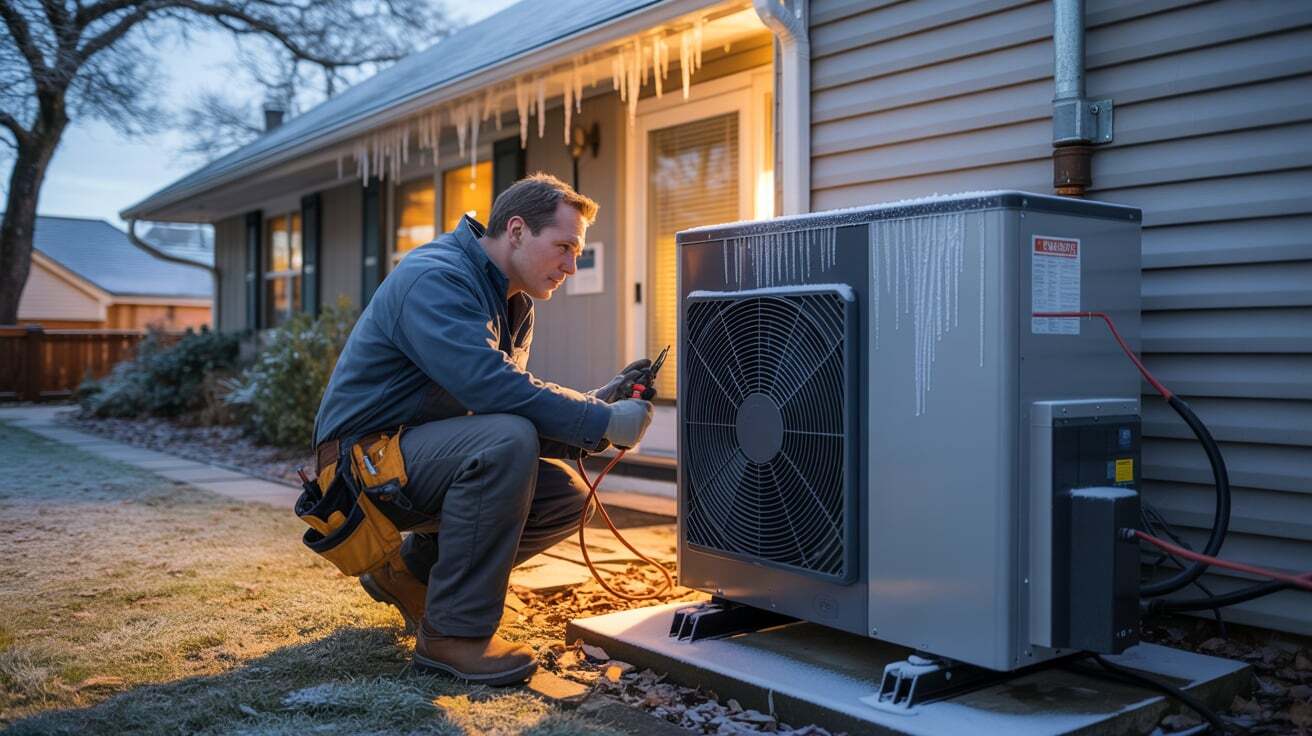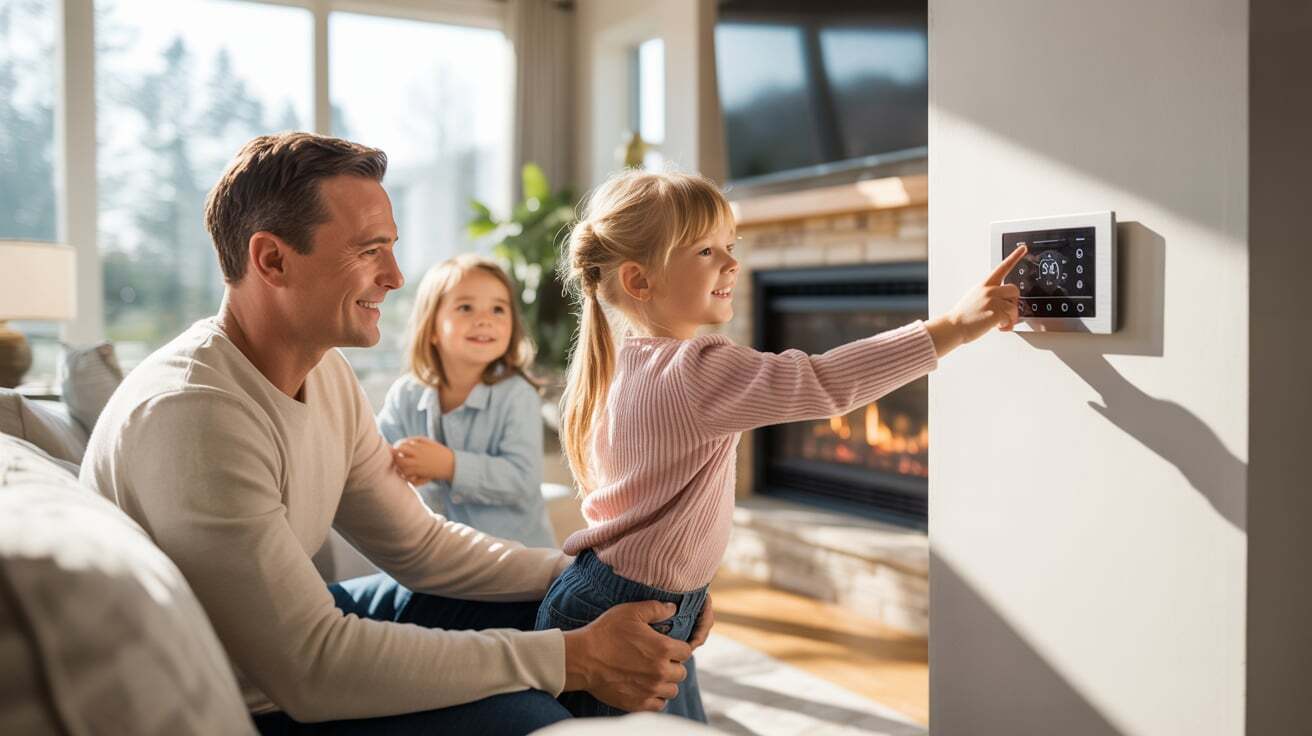Common Heat Pump Problems and How to Fix Them
Your heat pump kept your home comfortable all summer, but now that December’s cold has settled over North Texas, something’s off. Maybe you’ve noticed ice building up on the outdoor unit, or your energy bill jumped without explanation. You’re not imagining things—and you’re definitely not alone.
Here’s some info that might help: most heat pumps work reliably for 10-15 years, but about 30% develop significant issues by year 8. The good news? Many of these problems show clear warning signs before they become expensive emergencies. At Silver Spur Air, Heating, & Plumbing of DFW, we’ve helped many homeowners in Haltom City and Dallas spot these red flags early.
This guide walks through the most common heat pump problems we see heading into winter 2025-2026, what causes them, and when it’s time to call in certified technicians. With new EPA refrigerant regulations now in effect and winter temperatures testing your system’s limits, understanding these issues could save you hundreds of dollars and keep your family comfortable all season.
Why Your Heat Pump Might Be Struggling This Winter
Heat pumps work harder than most people realize. Unlike traditional furnaces that only heat, your system switches between heating and cooling modes throughout the year. This constant duty cycle, combined with Texas temperature swings, puts stress on components that eventually show wear.
The numbers tell the story: Consumer Reports found that heat pump failure rates climb significantly after year 8, with compressor problems affecting 15% of units and refrigerant leaks hitting another 12%. Meanwhile, the International Energy Agency notes that heat pumps remain 3-5 times more efficient than gas heating—when they’re working correctly. A struggling system can lose that efficiency edge fast, spiking your energy bills by 20-50% if problems go unchecked.
What changed in 2025? The EPA’s new refrigerant rules now require all new residential heat pumps to use A2L refrigerants like R-454B instead of the older R-410A. If you’re repairing an older system, parts costs have increased 20-30% due to phase-outs. We’ll explain what this means for repairs later in this article.
The Icing Problem: When Your Heat Pump Looks Like a Winter Sculpture
Walk outside on a cold Dallas morning and find your heat pump encased in ice? It can feel uncertain at times, but this is actually one of the most common winter issues—affecting about 40% of units during cold snaps.
What Causes Heat Pump Icing
Your outdoor unit naturally develops light frost during heating mode. The system should automatically run defrost cycles to melt this buildup. When those cycles fail or when airflow gets restricted, ice accumulates and blocks heat transfer. Your efficiency can drop by 40% almost overnight.
The three main issues:
- Low refrigerant levels (causes about 25% of icing cases)
- Dirty coils (responsible for 30% of winter failures)
- Blocked airflow around the unit (accounts for 20% of problems)
What You Can Observe
Before calling for service, check these signs:
- Frost or ice covering the outdoor coils
- Reduced warm air coming from your vents
- The unit running constantly without reaching the set temperature
- Less than 2 feet of clearance around the outdoor unit
Don’t try to chip ice off or pour hot water on the unit. Both actions can damage delicate fins and refrigerant lines.
What Certified Technicians Do
We use specialized gauges to check refrigerant pressures and test defrost sensors. If your system is low on refrigerant, it typically signals a leak that needs repair before recharging—simply adding more refrigerant doesn’t fix the underlying problem.
For systems using older R-410A refrigerant, repairs now cost more due to the 2025 phase-out. However, if you need significant repairs, upgrading to a compliant A2L system might qualify you for up to $2,000 in federal tax credits through the Inflation Reduction Act. Contact us to discuss whether an upgrade makes financial sense for your situation.
Strange Noises: Understanding What Your Heat Pump Is Trying to Tell You
Heat pumps make some operational sounds—a gentle hum, the whoosh of the reversing valve switching modes. But rattling, buzzing, thumping, or hissing? Those demand attention.
Common Sounds and Their Meanings
Buzzing or humming: Usually points to electrical issues, often with the contactor. A user on X noted that contactors are involved in about 90% of startup failures. These small components handle significant electrical loads and wear out over time.
Thumping or banging: Suggests problems with the blower motor or fan blades. Loose components can reduce efficiency by 10-20% while they gradually damage other parts.
Hissing: This is the sound of refrigerant escaping. Under EPA regulations, only certified technicians can legally handle refrigerant. DIY attempts risk fines and potentially $1,500+ in compressor damage if contamination occurs.
Squealing or grinding: Points to failing bearings in the motor or fan assembly.
The Professional Diagnosis
When you call Silver Spur Air, Heating, & Plumbing of DFW, our NATE-certified technicians perform electrical tests and mechanical inspections to pinpoint the exact source. Repairs typically range from $200 for simple component replacement to $600 for more complex valve or motor issues.
Catching noise problems early prevents bigger failures. What starts as a $200 repair can escalate to a $1,500+ compressor replacement if metal shavings from worn bearings contaminate the refrigerant system.
Short Cycling: Why Your Heat Pump Won’t Stay Running
Short cycling means your heat pump turns on, runs for 5-10 minutes, shuts off, then repeats the pattern. This wastes 20-30% of your energy while never fully heating your home.
Why Short Cycling Happens
The most common cause is improper sizing—a unit that’s too large for your home. About 50% of short cycling cases stem from this installation error. When a heat pump is oversized, it heats the immediate area around the thermostat too quickly, triggering shutdown before the whole house warms up.
Other causes include:
- Faulty thermostats sending incorrect signals (30% of cases)
- Refrigerant charge problems
- Clogged filters restricting airflow
What to Watch For
Normal heating cycles should run at least 15 minutes. If you’re seeing shorter runs with frequent restarts, and your energy bills have jumped 25% or more, you’re likely dealing with short cycling.
How Professionals Fix It
For oversized units, the solution involves either zoning systems or, in severe cases, replacement with correctly sized equipment. A proper Manual J load calculation determines the right size for your specific home—square footage alone doesn’t tell the whole story.
For thermostat issues, we test calibration and wiring, replacing faulty components as needed. Repairs typically run $250-400, but the IEA reports energy savings of around 30% once the problem is resolved.
In Haltom City and Dallas, local building codes require professional installation for zoning systems, so this isn’t a DIY project. We’ve helped many homeowners navigate these requirements while optimizing comfort across multiple rooms.
Insufficient Heating: When Cold Air Blows Instead of Warmth
This problem frustrates homeowners more than almost any other. You’ve set the thermostat to 72°F, but vents barely blow lukewarm air while your family reaches for extra blankets.
The Root Causes
Clogged filters account for about 50% of insufficient heating complaints. When airflow gets restricted, your heat pump can’t move enough warm air through your home. The Coefficient of Performance (COP)—a measure of heating efficiency—can drop from 4 (meaning 400% efficient) to 2, essentially cutting your heating capacity in half.
Compressor strain causes another 20% of cases. As compressors age or develop mechanical problems, they can’t compress refrigerant effectively. This reduces the temperature difference you should feel at your vents.
Quick Home Checks
Measure the temperature of air coming from your supply vents and compare it to the air being pulled into your return vents. You should see at least a 15°F difference. Anything less suggests your system isn’t heating effectively.
Also check your outdoor unit. Is it running? Is the fan spinning? Sometimes the outdoor unit stops working while the indoor fan keeps blowing, creating the sensation of “cold air” that’s really just room-temperature circulation.
Professional Solutions
Our full diagnostic service (with the fee credited toward repairs if you proceed) identifies whether you’re dealing with airflow problems, refrigerant issues, or compressor concerns. Clean coils and fresh filters restore efficiency quickly. More serious compressor problems require expert assessment.
With 2025 regulations now mandating A2L refrigerants for new installations, if your older system needs major compressor work, we can advise whether repair or replacement makes better financial sense. Many homeowners find that upgrading saves 30% on heating costs while qualifying for federal rebates.
Energy Bills Through the Roof: When Your Heat Pump Costs Too Much to Run
Your heat pump should cut energy costs compared to traditional heating. When bills suddenly spike 20-50% higher than previous winters, your system is crying for help.
Why Bills Increase
Refrigerant leaks cause about 30% of high-bill complaints. Low refrigerant forces your system to run longer to achieve the same heating, burning extra electricity for reduced output.
Icing and airflow problems account for another 25%. Ice-covered coils can’t transfer heat efficiently, so the system compensates by running constantly.
The IEA notes that even dirty coils alone can add roughly $100 per year to operating costs. Multiple problems compounding together drive bills even higher.
What This Means for You
If your December electric bill is running 15% or more above your usual winter usage, schedule an efficiency audit from Silver Spur Air, Heating, & Plumbing of DFW.
The good news: addressing these issues often delivers 50% savings on the portion of your bill attributed to heating. Many homeowners see the audit cost recovered within a single billing cycle.
Understanding 2025 Refrigerant Regulations and What They Mean for Repairs
Here’s what typically happens with the new EPA rules: As of January 1, 2025, all new residential heat pumps must use A2L refrigerants with lower global warming potential. The older R-410A refrigerant is being phased out.
Impact on Your Existing System
If you own a pre-2025 heat pump using R-410A, you can still get it serviced. However, as production winds down, R-410A costs have increased. Parts availability affects repair pricing—we’re seeing increases of 20-30% for some refrigerant-related repairs.
When Upgrades Make Sense
For minor repairs like fan motors or thermostats, fixing your current system makes sense regardless of refrigerant type. But if you’re facing major refrigerant leaks or compressor replacement, the math changes.
New A2L systems qualify for significant incentives:
- Federal tax credits up to $2,000 through the Inflation Reduction Act
- Better efficiency ratings (SEER2 16+, HSPF2 8.8 minimum)
- Lower long-term operating costs
Our techs help you evaluate: repair cost + remaining system life + current efficiency versus new system cost – rebates + improved efficiency. There’s usually a clear answer for your specific situation.
Safety and Compliance
A2L refrigerants are mildly flammable, requiring updated installation techniques. Only EPA 608-certified technicians can legally handle any refrigerant work. DIY attempts risk fines exceeding $10,000 per violation, void equipment warranties, and create genuine safety hazards.
For Haltom City and Dallas homeowners, Texas follows federal EPA rules while adding local energy code requirements. We help coordinate everything to ensure your system meets all applicable standards.
What Silver Spur Air, Heating, & Plumbing of DFW Does Differently
We work to ensure your heat pump receives thorough, honest diagnosis before any repair recommendations. Here’s typically what happens during our service call:
Step 1: Visual Inspection – We examine your outdoor and indoor units for obvious issues like ice buildup, debris, or damaged components.
Step 2: Airflow Testing – Proper airflow is critical for efficiency. We measure static pressure and check ductwork for restrictions.
Step 3: Electrical Check – Voltage, amperage, and capacitance tests identify electrical problems before they cause expensive damage.
Step 4: Refrigerant Assessment – Using professional gauges, we verify pressures and temperatures match manufacturer specifications. If readings are off, we determine why before adding refrigerant.
Step 5: Efficiency Report – You receive clear documentation of current performance compared to expected standards, plus recommendations prioritized by urgency and cost-effectiveness.
This systematic approach, used throughout our 15+ years serving the DFW area, catches problems other providers miss. We’ve helped many businesses and families avoid emergency breakdowns by addressing small issues during routine service.
When to Call for Service vs. Seasonal Maintenance
Some problems need immediate attention. Others can wait for scheduled maintenance. Here’s how to tell the difference:
Call us today if:
- Ice completely covers your outdoor unit
- You hear loud grinding or metal-on-metal sounds
- Your system won’t turn on at all
- You smell burning or electrical odors
- Bills have suddenly doubled without explanation
Schedule routine maintenance if:
- You hear occasional squeaks or rattles
- Performance has gradually declined over months
- You can’t remember your last professional tune-up
- You’re approaching your system’s 8-10 year mark
Generally speaking, annual professional maintenance prevents about 70% of problem escalations. The service typically includes filter changes, coil cleaning, refrigerant checks, and electrical testing—addressing the small issues before they become expensive emergencies.
Keep Your Home Comfortable This Winter and Beyond
Heat pumps deliver exceptional efficiency and comfort when properly maintained. The technology continues improving, with 2025 bringing better refrigerants and higher efficiency standards. But even the best equipment needs professional care to perform reliably.
If you’ve noticed any of the warning signs we’ve covered—icing, strange noises, short cycling, insufficient heating, or climbing energy bills—don’t wait for a complete breakdown on the coldest night of the year. Our team at Silver Spur Air, Heating, & Plumbing of DFW is ready to diagnose and resolve heat pump problems quickly, with transparent pricing and expert workmanship.
Whether you need emergency repairs, routine maintenance, or advice on navigating 2025 refrigerant regulations and available rebates, we’re here to help. Contact Silver Spur Air, Heating, & Plumbing of DFW today to schedule service and ensure your heat pump keeps your family comfortable all winter long.
Frequently Asked Questions About Heat Pump Problems
How often should I have my heat pump professionally serviced?
We help coordinate annual maintenance visits—ideally before the heating season starts in fall and cooling season begins in spring. This schedule catches wear before it causes failures and maintains manufacturer warranty requirements for many brands.
Can I clean the outdoor unit myself?
You can gently remove leaves and debris from around the unit and keep 2 feet of clearance on all sides. However, cleaning the coils themselves requires specialized equipment and knowledge. Improper cleaning can bend fins and reduce efficiency.
Why does my heat pump blow cool air when heating?
Heat pumps deliver air that’s typically 90-95°F—noticeably cooler than the 120-140°F from gas furnaces. This feels “cool” if you put your hand directly in the airflow, but it effectively heats your home. If the air feels truly cold (below room temperature), that signals a problem requiring professional diagnosis.
How long do heat pumps typically last in the Dallas area?
With proper professional maintenance, most heat pumps reach 10-15 years of reliable service. However, Consumer Reports data shows 30% experience major issues by year 8, typically due to skipped maintenance or deferred repairs. Our experience serving Haltom City and Dallas shows that homeowners who schedule annual tune-ups usually see their systems last toward the upper end of that range.
What should I do if my heat pump freezes during a cold snap?
Switch your system to emergency heat mode (if equipped) or turn it off and call for service. Don’t try to chip ice away or pour hot water on the unit. The underlying cause—whether low refrigerant, airflow restrictions, or defrost sensor failure—needs professional diagnosis to prevent recurring problems.
Are heat pump repairs more expensive now with the 2025 refrigerant changes?
Repairs involving R-410A refrigerant have increased 20-30% due to phase-outs. However, many repairs (thermostats, fans, electrical components) aren’t affected. For major refrigerant system repairs, upgrading to compliant equipment often makes better financial sense when you factor in available rebates and improved efficiency. We provide honest cost comparisons so you can make informed decisions.
Should I replace my older heat pump or keep repairing it?
This depends on several factors: age of your system, cost of needed repairs, current efficiency, and available rebates. A helpful guideline: if repair costs exceed 50% of replacement cost and your system is over 10 years old, replacement usually makes better financial sense. We evaluate your specific situation and provide recommendations without pressure—our goal is helping you make the choice that serves your family best.


